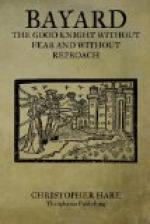[Illustration: Bayard defends the Bridge.]
Then the Good Knight cried to his companion, “My lord the Equerry, my friend, go instantly and fetch our men to guard this bridge, or we are all lost; meantime I will do my best to amuse them until you come, but make all haste.” This he did, and the Good Knight, lance in rest, galloped across the bridge to the other end, where the Spaniards were on the point of passing. But, like a lion in his rage, Bayard rushed at them with so furious an onset that two or three of the foremost men were driven back and hurled into the water, from whence they rose no more, for the river was wide and deep. For a moment they were driven back, but seeing there was only one knight they attacked him so furiously that it was a marvel he could resist them. But he came to a stand against the barrier of the bridge that they might not get behind him, and made so desperate a fight with his sword, raining blows on all who came near, that he seemed to the Spaniards more a demon than a man.
In vain they cast pikes, lances, and other arms against him; the Good Knight seemed to bear a charmed life. In fact, so well and so long did he defend himself that his foes began to feel a superstitious dread of this invincible champion when, after the space of full half an hour, his friend, le Basco, arrived with a hundred men-at-arms.
The historian Champier adds that when Bayard saw help approaching he cried, with a loud voice, “Haste ye, noble Frenchmen, and come to my help.” Not satisfied with driving back the Spaniards from the bridge, the gallant little company pursued them for a good mile, and would have done more but they saw in the distance a great company of seven or eight hundred Spanish horsemen.
With all his dauntless courage, Bayard had the instinct of a good general, and he said to his companions: “Gentlemen, we have done enough to-day in saving the bridge; let us now retire in as close order as possible.” His advice was taken, and they began to retreat at a good pace, the Good Knight always remaining the last and bearing all the brunt of the rear attack. This became more difficult every minute, as his horse, on which he had fought all that day, was so worn out that it could scarcely stand.
All of a sudden there was a great rush of the enemy, sweeping like a flood over the French men-at-arms, so that many were thrown to the ground. The horse of the Good Knight was driven back against a ditch, where he was surrounded by twenty or thirty horsemen, who cried: “Surrender, surrender, my lord!” Still fighting to the last, he could only make answer: “Gentlemen, I must indeed yield to you, for, being alone, I can no longer fight against your might.”
If all the accounts of contemporary historians did not agree on the subject we could hardly believe that one hero could keep back two hundred men at the narrow entrance of the bridge for close upon half an hour. That after so tremendous a fight Bayard could pursue the enemy, and defend the rear of his retiring companions, is indeed a marvellous achievement. The wonder is not that he was taken prisoner at last, but that he should have held out so long.




